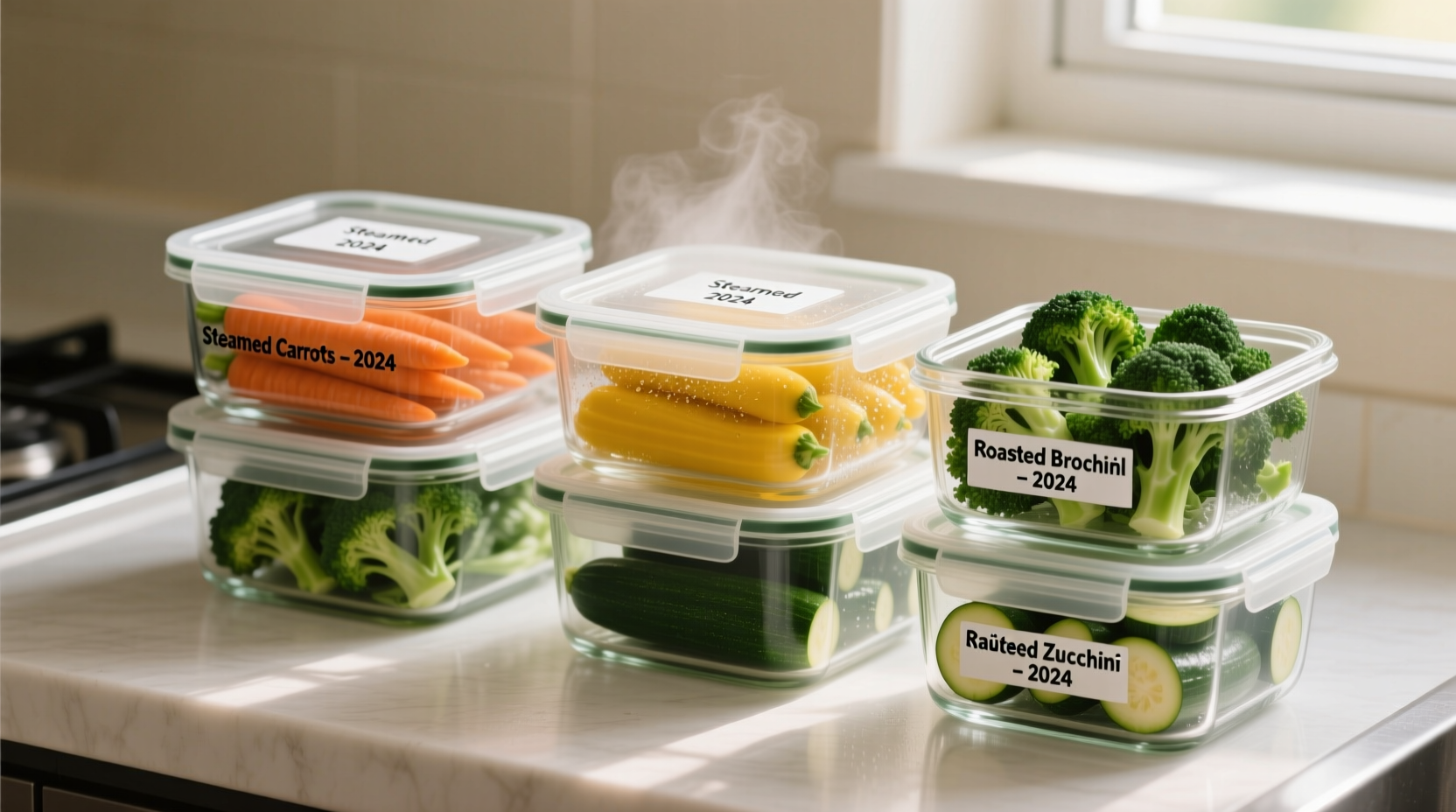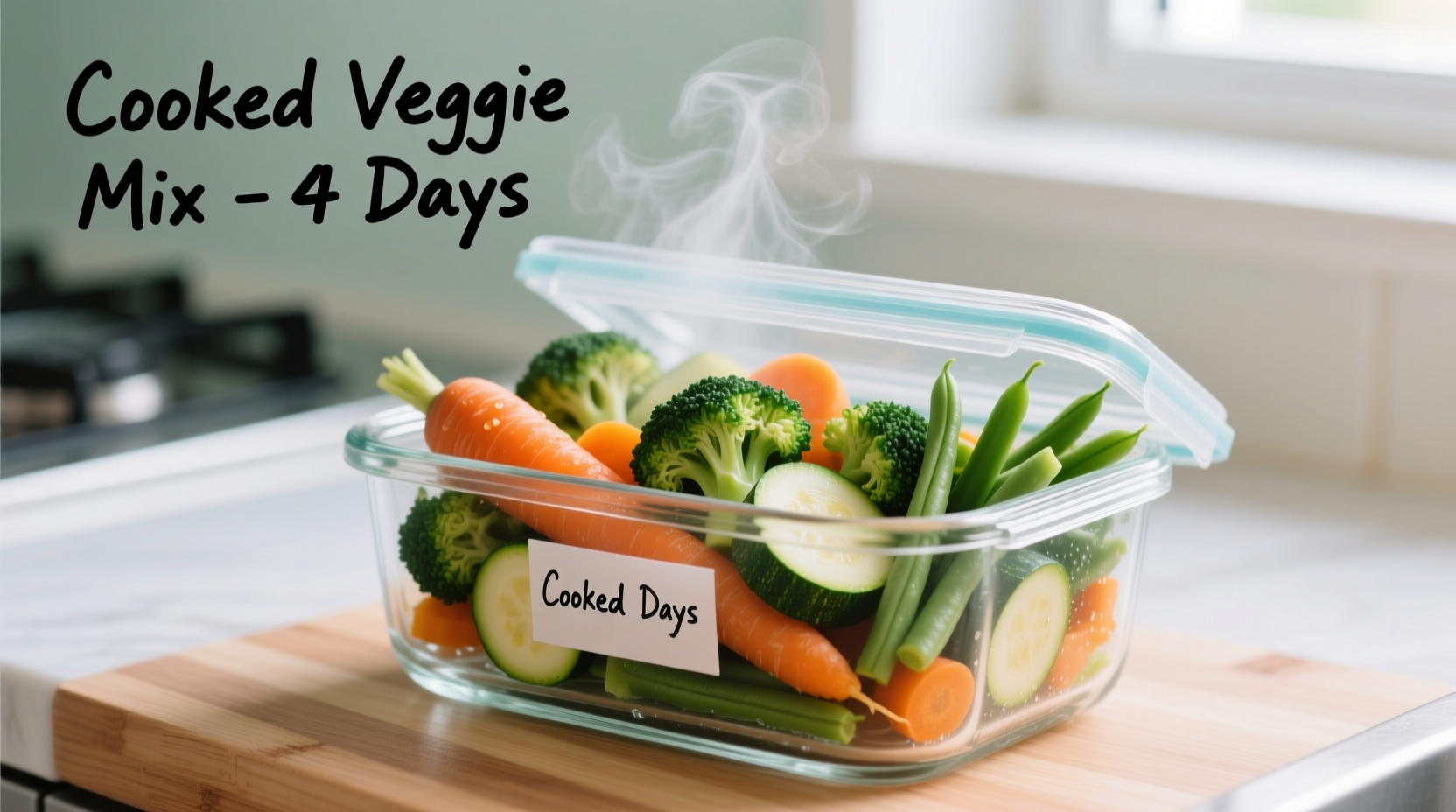Why Proper Storage of Cooked Vegetables Matters
Understanding how long cooked vegetables remain safe to eat isn't just about avoiding food waste—it's a critical food safety issue. According to the USDA Food Safety and Inspection Service, improper storage of leftovers causes millions of foodborne illness cases annually. When you know exactly how long your cooked veggies last, you protect your family while making the most of your meal prep efforts.
How Long Different Cooked Vegetables Last: Complete Reference
Not all vegetables share the same shelf life after cooking. Dense, low-moisture vegetables generally last longer than their watery counterparts. Here's what food safety experts recommend:
| Vegetable Type | Refrigerator Shelf Life | Best Storage Method |
|---|---|---|
| Root vegetables (carrots, beets, potatoes) | 5-7 days | Airtight container with paper towel to absorb moisture |
| Cruciferous vegetables (broccoli, cauliflower) | 4-5 days | Ventilated container with damp paper towel |
| Squash & zucchini | 4-5 days | Airtight container, no added moisture |
| Leafy greens (spinach, kale) | 3-4 days | Container lined with paper towels |
| Tomatoes & peppers | 4-5 days | Airtight container, no washing before storage |
| Corn & peas | 3-4 days | Airtight container with minimal moisture |
4 Critical Factors That Determine Shelf Life
Your refrigerator's temperature isn't the only factor affecting how long do cooked vegetables last in the fridge. Consider these often-overlooked elements:
1. Initial Cooking Method Matters
Steamed vegetables retain more moisture than roasted ones, affecting their storage longevity. According to research from the Cornell Food Venture Center, vegetables cooked with dry heat methods (roasting, grilling) typically last 1-2 days longer than boiled or steamed counterparts because they contain less residual moisture that promotes bacterial growth.
2. Container Choice Makes a Difference
Glass containers with tight-sealing lids preserve cooked vegetables 20-30% longer than plastic containers, according to food preservation studies. The World Health Organization emphasizes that airtight storage prevents cross-contamination and maintains consistent temperature.
3. Cooling Time Before Refrigeration
Leaving cooked vegetables at room temperature for more than 2 hours before refrigerating significantly reduces their safe storage time. The FDA's FoodKeeper app guidelines specify that the "danger zone" for food safety is between 40°F and 140°F, where bacteria multiply rapidly.
4. Added Ingredients Change the Timeline
Cooked vegetables mixed with dairy, eggs, or meat products have a shorter shelf life than plain cooked vegetables. A vegetable casserole with cheese typically lasts only 3-4 days, while plain roasted vegetables might last 5-7 days.

When to Toss: 5 Clear Signs Your Cooked Vegetables Have Spoiled
Don't rely solely on expiration dates—your senses provide the most reliable indicators of food safety. Watch for these warning signs that your cooked vegetables have exceeded their safe storage period:
- Texture changes: Slimy or mushy consistency indicates bacterial growth
- Odor changes: Sour, rotten, or unpleasant smells (fresh cooked vegetables should have a mild, pleasant aroma)
- Visible mold: Any fuzzy growth, even in small spots
- Color changes: Unusual darkening or discoloration beyond normal oxidation
- Off-taste: If it tastes sour or unpleasant when sampled (only do this if no other spoilage signs are present)
Proven Methods to Extend Your Cooked Vegetables' Freshness
Professional chefs use these science-backed techniques to maximize the shelf life of cooked vegetables:
The Paper Towel Technique
Place a dry paper towel at the bottom of your storage container before adding cooked vegetables. This absorbs excess moisture that accelerates spoilage. Replace the paper towel daily for optimal results.
Vinegar Rinse Method
For vegetables prone to quick spoilage like leafy greens, a quick rinse in a solution of 1 part vinegar to 3 parts water before cooking can extend refrigerator life by 24-48 hours, according to research published in the Journal of Food Protection.
Strategic Container Filling
Fill containers completely to minimize air exposure, which causes oxidation. If you have small amounts of leftovers, use appropriately sized containers rather than large ones with lots of air space.
Food Safety Risks of Consuming Old Cooked Vegetables
Eating cooked vegetables past their safe storage window isn't just unpleasant—it poses real health risks. The Centers for Disease Control and Prevention reports that common bacteria like Salmonella, Listeria, and E. coli can grow in improperly stored cooked vegetables. Symptoms of food poisoning typically appear 6-48 hours after consumption and may include nausea, vomiting, diarrhea, and fever.
Particularly vulnerable populations—including young children, elderly individuals, pregnant women, and those with compromised immune systems—should be especially cautious about consuming cooked vegetables stored beyond 4 days.
Freezing Cooked Vegetables: Your Long-Term Solution
If you won't consume your cooked vegetables within the recommended timeframe, freezing extends their life significantly:
- Blanch vegetables first for best texture retention
- Store in airtight freezer bags with air removed
- Label with contents and date
- Most cooked vegetables maintain quality for 10-12 months in the freezer
When reheating frozen cooked vegetables, do so directly from frozen without thawing to preserve texture and minimize bacterial growth opportunities.
Smart Meal Planning to Reduce Waste
Understanding how long cooked vegetables last in the refrigerator transforms your meal planning. Cook larger batches of longer-lasting vegetables like carrots and beets at the beginning of the week, then prepare more perishable items like leafy greens closer to consumption time. This approach maximizes freshness while minimizing food waste—saving you both time and money throughout the week.











 浙公网安备
33010002000092号
浙公网安备
33010002000092号 浙B2-20120091-4
浙B2-20120091-4